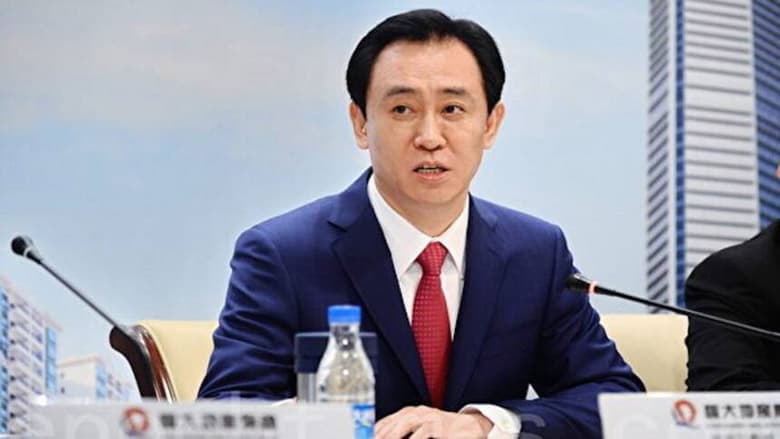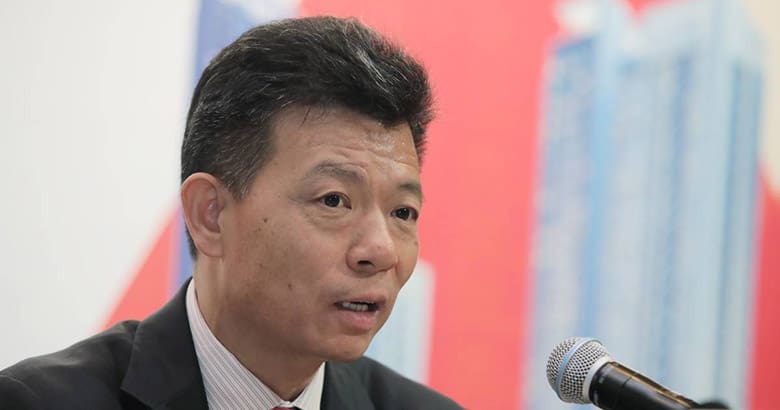
Xu Jiayin will soon have some government help running Evergrande
With no sign that China Evergrande had made overdue payments on two offshore bonds by Monday’s hard deadline, the embattled developer sought to calm investor jitters by revealing the establishment of a “risk management committee” featuring officials from the Guangdong provincial government and mainland state-owned enterprises.
The committee, which operates independently of Evergrande’s board, “will play an important role in mitigating and eliminating the future risks” of the heavily indebted group, Shenzhen-based Evergrande said in a Monday filing with the Hong Kong stock exchange.
Evergrande founder and chairman Xu Jiayin will chair the new panel alongside a co-chairman, Liu Zhihong, who is deputy general manager of Guangdong Holdings, the local government financing vehicle of the southern province. The committee’s members also include officers of two other state-backed firms, bad asset bank China Cinda Asset Management and Guangzhou Yuexiu Holdings, a city investment vehicle of the Guangdong provincial capital.
The news came as Evergrande was poised to miss nearly $82.5 million in interest payments on two sets of dollar-denominated bonds issued by an offshore financing vehicle, Scenery Journey, marking the group’s first default on publicly traded offshore debt. After hitting an all-time low on Monday, Evergrande’s HKEX-listed shares rose 1.1 percent in Tuesday trading on hopes that the committee would oversee an orderly debt restructuring at the beleaguered developer.
Dusting Off the HNA Playbook
The cleanup of the Evergrande mess appears to be moving along the same lines as the state-directed restructuring of failed conglomerate HNA Group, which filed for bankruptcy early this year after racking up debts reported to total $170 billion.

Kaisa chairman Kwok Ying Shing had a big deadline on Tuesday
In the case of HNA, the government of its home province of Hainan in early 2020 took control of the debt-saddled conglomerate by sending in a task force led by two state officials appointed to leadership roles on the company’s board after management repeatedly defaulted on financial obligations and creditors began seizing assets.
Evergrande had put investors on edge after Friday’s market close with a statement revealing that the developer had received an unspecified demand to fulfil a $260 million financial obligation.
“In light of the current liquidity status of the Group, there is no guarantee that the Group will have sufficient funds to continue to perform its financial obligations,” Evergrande said in an exchange filing late Friday.
That failure to perform seems to have reared its head with the $82.5 million in Scenery Journey payments, which first came due on 6 November and then reached the end of a grace period on Monday at midnight New York time. Reuters reported Tuesday that some of the bondholders had not received their payments, with the agency citing four people with knowledge of the matter.
Kaisa on the Brink
One of Evergrande’s fellow troubled developers, Shenzhen-based Kaisa Group Holdings, was facing the spectre of its own default with $400 million in bonds maturing on Tuesday. The Hong Kong-listed group controlled by the Kwok family had failed to persuade holders of 95 percent of the notes by value to accept a November offer of a swap for new bonds maturing 6 June 2023 at the same interest rate.
Bloomberg reported that Kaisa — the first Chinese developer to default on offshore bonds back in 2015 — had received a formal forbearance proposal from a group of its bondholders on Monday evening. The creditor group is being advised by New York-based Lazard and is offering a deal that would inject cash into Kaisa and enable the developer to avoid a former default, according to Bloomberg’s sources.
Kaisa had confirmed late last month that it failed to pay $88 million in interest due on offshore bonds on 11 and 12 November, with the $1.5 billion in notes allowing for a 30-day grace period before formal default kicks in.
Also on Monday, the developer’s property management arm, Kaisa Prosperity Holdings, announced the resignation with immediate effect of executive director and vice chairwoman Kwok Hiu-ting, the daughter of Kaisa founder and chairman Kwok Ying-shing. That move followed a Friday announcement by Kaisa Health Group Holdings that Kwok Hiu-ting’s two sisters, Kwok Ho Lai and Kwok Hiu Yan, had resigned from the board of the healthcare subsidiary of Kaisa Group with both having been appointed to their executive director positions since mid-2021.
Reuters reported in October that Kaisa Group was shopping its 67.18 percent stake in Kaisa Prosperity in a bid to raise cash to meet its swelling debt commitments.
Leave a Reply